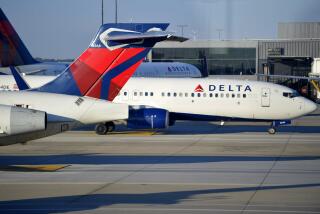Airlines, Buses, Hotels Address Accessibility
Travelers with disabilities have never had it easy, and a flurry of recent cases provides further evidence of that. But these cases may well improve access to airplanes, buses, hotels and perhaps even foreign-flagged cruise ships.
In the last four months, United Airlines and Greyhound Lines settled claims alleging that they mistreated passengers using wheelchairs. In December, after complaints prompted a federal probe, Days Inns of America agreed to improve access at its new hotels nationwide.
Meanwhile, the Justice Department is challenging cruise lines that say they’re exempt from the Americans With Disabilities Act. That law, passed by Congress in 1990, aims to improve access as businesses renovate old buildings and construct new ones.
There are at least two easy lessons from all this. First, the ADA doesn’t guarantee that all lodgings and transport will meet its requirements. Many businesses have complained that the law is vague. Often it takes a lawsuit to settle rival interpretations. With so much uncertainty, it’s crucial to ask detailed questions about telephones, toilets, doorways, halls and other facilities before you book.
Second lesson: If you think a hotel, airline, bus or ship has fallen short, complain. It could ease the way for those who follow. Consider these cases:
* The United Airlines case grew out of a January 1999 incident in which a passenger in a wheelchair set off alarms at a metal detector at Dulles International Airport in suburban Washington. The passenger was sent to a private room for a security screening--but the federal Air Carrier Access Act (which predates ADA by four years) requires that wheelchair passengers be screened in public, as are other passengers. After a probe by the U.S. Department of Transportation, United agreed earlier this month to pay a $50,000 fine and revise its practices.
United isn’t alone. In November, the DOT logged 70 complaints from disabled passengers; 11 concerned American Airlines, eight each Continental and Delta, and five each Southwest and United. That was an increase from 41 complaints in November 1998. (The DOT began releasing airline-by-airline complaint tallies on access issues just last fall. Previously, the tallies were lumped together as one number for major carriers.)
The DOT records complaints by phone at (202) 366-2220, by e-mail at airconsumer@ost.dot.gov and by conventional mail at Aviation Consumer Protection Division, U.S. Department of Transportation, Room 4107, C-75, Washington, DC 20590. (More information is available on the DOT’s Internet site at https://www.dot.gov/airconsumer/problems.htm.) For questions and complaints about hotels and other facilities covered by the ADA, the Justice Department maintains an information line at (800) 514-0301 (voice) and (800) 514-0383 (TDD).
* The Greyhound settlements followed complaints by 14 disabled passengers who said they were denied boarding assistance, that they were injured while being carried on and off buses or that they were verbally harassed. Alleging violations of the ADA, the passengers took their cases to the Justice Department. Greyhound, a Dallas-based company that carries more than 20 million passengers annually, agreed to pay more than $17,500 in damages to the 14 and, beginning April 1, will guarantee accessible (lift-equipped) buses between any of the 2,600 points it serves as long as passengers give 48 hours’ notice. The only exceptions: a limited set of “excusable circumstances” defined in the agreement. The agreement also requires Greyhound to train employees in helping people with disabilities and to set up an internal system to address complaints.
* In early December, operators of Days Inn of America, one of the nation’s largest hotel chains, signed a settlement calling for greater accessibility to new U.S. hotels. The agreement by Cendant Corp., which owns Days Inn, resolved five Justice Department lawsuits dating to 1996.
Days Inn agreed to pay for an independent survey of its new hotels to identify ADA problems and set up a $4.75-million revolving fund to help franchisees finance renovations. The company also agreed to pay a $50,000 fine.
The agreement followed a federal investigation of new Days Inns nationwide that found insufficient parking; inaccessible entrances and walkways; inadequate space for wheelchairs in guest rooms and bathrooms; and doors too narrow for wheelchairs.
Late last year, Justice officials also won a promise of accessibility improvements at the MGM Grand Hotel, Casino and Theme Park in Las Vegas. The MGM Grand, which has more than 5,000 rooms, had been named in complaints by three guests. Under a settlement, those guests received $165,000 and MGM Grand agreed to increase the number of “fully accessible” guest rooms (including roll-in showers) from 76 to 112. The pact also required installing new restroom stalls, lowering some gaming tables, improving access to the high-roller gaming areas and increasing wheelchair seating for concerts and other events.
* Most cruise ships, unlike airlines, hotels and bus companies, have operated for years outside many U.S. laws, including ADA requirements. Though ships often include many facilities for disabled travelers, the vessels are registered in foreign countries, which allows cruise lines to sidestep ADA mandates. But a new legal challenge seeks to extend ADA coverage to the cruise industry and has the backing of the Justice Department.
In 1998, a wheelchair-using passenger named Tammy Stevens sued Premier Cruises, asserting that the ADA should apply to the company’s Big Red Boat (also known as the Oceanic). In U.S. District Court for the Southern District of Florida, the judge ruled against Stevens, noting that the ship is registered in the Bahamas. But she has since appealed to the 11th Circuit Court, and the Justice Department has filed a friend-of-the-court brief urging application of the ADA to foreign-flagged ships with substantial U.S. ties.
Meanwhile, the cruise industry’s Washington lobbying organization, the International Council of Cruise Lines, continues to argue that the ADA shouldn’t be applied to cruise lines because of their international nature.
*
Christopher Reynolds welcomes comments, but cannot respond individually to letters and calls. Write Travel Insider, Los Angeles Times, Times Mirror Square, Los Angeles 90053, or e-mail chris.reynolds@latimes.com.
More to Read
Sign up for The Wild
We’ll help you find the best places to hike, bike and run, as well as the perfect silent spots for meditation and yoga.
You may occasionally receive promotional content from the Los Angeles Times.







